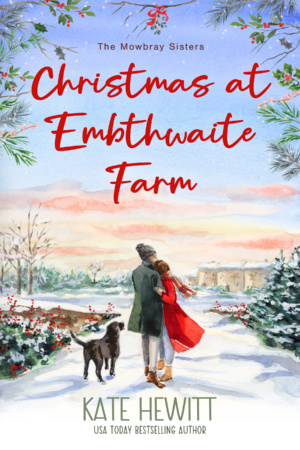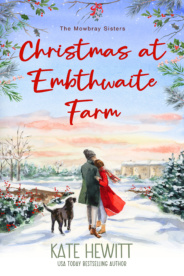Start reading this book:

Share This Excerpt
She felt like Little Red Riding Hood. She had the cape—well, technically, a red coat, but still—and the basket, made of wicker with a gingham cloth covering the top, looped over one arm. She was making her way through the woods, or at least a part of the North Yorkshire countryside that looked woodsy—a sweeping drive that snaked past fir and yew trees as well as some towering rhododendrons, up to the Mathering Manor House Hotel, where the Big Bad Wolf awaited her.
Well, Harriet Mowbray told herself, she didn’t know that the owner of the hotel was Big Bad Wolf-esque, but it felt as if he held her fate in his hands, and that was plenty scary enough.
She didn’t normally do stuff like this. She didn’t go out and solicit strange men—with cookies, nothing else, mind—and she didn’t make bold approaches to anyone, anywhere, ever. She didn’t ‘grab life with both hands’ or ‘seize the opportunity’ or ‘suck the marrow out of life’, or whatever else you wanted to put in a meme or on a mug. Harriet knew she had lived her life safely. Smally, if that was even a word. She’d done it first out of fear and then later as a choice. Why risk and get hurt? Try and fail? Oh yes, she knew those quotes, too. Failure is success in progress, said Albert Einstein. Or Walt Disney: Everyone falls down. Getting up is how you learn to walk.
Easy to put on a bumper sticker but less so to live out day by day. And Harriet had chosen not to—yet here she was, standing at the bottom of the sweeping drive up to Mathering Manor House Hotel, about to try, at least in this.
What on earth had she been thinking?
Her sister, Rachel, had been the one to chivvy her along, telling her she should expand her fledgling, barely there bakery business, solicit new customers, find new avenues of revenue, speaking like the investment manager she was, when the truth was, Harriet didn’t even have a bakery business. Not really.
“I’ve done some cookies and scones for a couple of functions,” she’d told Rachel flatly, as they’d stood on opposite sides of the kitchen table, facing each other off like opponents in a boxing ring. For a long time, that was exactly how her relationship with her sister had felt—a low-level, and sometimes not so low, thrum of antagonism between them, a hum of resentment in the air, whenever they saw each other, which had been rarely.
Harriet knew she was to blame for it, at least in part. Maybe even a large part. Since Rachel had come back from her high-flying life in London to Embthwaite Farm, tucked in the rolling moors of North Yorkshire, they’d managed to find something of an equilibrium, but it had taken a while. Rachel had returned home to help care for their ailing father, and Harriet had felt she’d swanned in at the start, believing she knew best, and that Harriet had just been sitting on her hands and being useless. As usual.
Those first few weeks had been fairly fraught, and a couple of painfully honest conversations—the kind Harriet really didn’t like—had helped to expose old wounds, and then hopefully begun to heal them. Two months on from her sister’s arrival, the healing was still in process, but at least it was happening. Harriet knew she and her sister would always be very different people; Rachel was a go-getter, utterly focused on career and ambition, at least until recently. Since coming back home, she’d fallen in love with an old flame—their neighbour Ben Mackey—and he certainly had helped to soften a few of her edges.
But her sister still sometimes became impatient with Harriet’s endless doubts and dithering.
“What do you have to lose?” she’d demanded in exasperation, as they’d stood there in the kitchen. “Just ask. If they don’t want your baked goods, they’ll say so. End of.”
And that will crush me, Harriet had thought but not said. She knew Rachel wouldn’t understand. She didn’t know what it was like to feel utterly rejected, even if she thought she did, because back in year seven, Ben Mackey hadn’t sat with her on the school bus. Harriet had heard the whole story and she’d sympathised, she had, even as part of her had thought, Really? That’s what held you back all this time?
Because meanwhile she’d had a mother who had abandoned her—and yes, she’d abandoned Rachel, too, obviously, but she’d at least waited until Rachel had gone to university—and a father who more or less couldn’t stand her—and he loved Rachel, as much as he loved anyone, that was—to contend with. Sorry, Rach, but I think I win the rejection stakes.
Not that it was a competition anyone, Harriet included, wanted to win, but it explained why she wasn’t eager to be rejected by anyone, over anything, ever again. Even over a simple matter of cookies.
Harriet hitched the basket a little further up on her arm as she eyed the steep, sweeping drive. If she went back home now, Rachel would know she’d chickened out. It annoyed her that she still cared that much about what her sister thought, and part of her wanted to stalk back home defiantly and say: So what? I didn’t go. I didn’t want to go.
Except she actually did want to.
She really wanted her bakery business—such as it was—to succeed. She’d been trying to get it going for several months, but every time she felt as if she managed to get a bit of momentum, something set her back. An order was cancelled. A bakery she’d approached to supply with fresh bread had backed off, claiming her kitchen wasn’t up to the necessary hygiene standards (it was now, and they still weren’t interested). Each time she worked up the courage to ask someone if they would like to collaborate with Embthwaite Treats, a little part of her died when they said sorry, no, and sometimes not even sorry. No good, love. We’ve got a contract with another supplier. Or: I’m afraid we decided to go with someone else. Or simply: Nope, not interested. All those rejections hurt. A lot. And it had taken a lot to make herself get back up again, steel herself to try again. She’d started to wonder if she should even bother. She hadn’t in the past, so why now?
The truth was, she’d had more than a sneaking suspicion that the gigs she had got—a couple of parties and supplying a nearby tea shop—were out of pity. It felt like everyone in Mathering, population four thousand, knew about Harriet Mowbray, the sister who hadn’t left to make something of herself. Who hadn’t even managed to get her A levels. Who had been living at home, picking up occasional work when she could, and going absolutely nowhere.
Besides all that, now that Rachel was home, watching her on the sidelines, telling her to try harder, her failure wouldn’t be the quiet slinking away that it usually was. It would be even more shaming. Rachel would tsk and shake her head and say: Harriet, you are your own worst enemy.
As if she didn’t know that already.
Harriet took a deep breath as she transferred the heavy basket to the other arm. She’d made five separate batches of Christmas cookies as samples for the manor house hotel, hoping they might want her to be a regular supplier after their grand opening the week before Christmas.
Rumour was the hotel had been bought by a mysterious millionaire, someone from far away, London maybe, or even abroad, who had been seen out and about on rare occasions although no one seemed to be able to say much about him. The whole town had been abuzz with the news, although Harriet couldn’t be sure how much was true and how much was the usual village gossip. What was true, was the manor house was being renovated, was opening before Christmas, and maybe needed cookies.
She was doing this.
Taking another deep breath, Harriet started up the lane. It was steep and curving, and her calves had begun to ache along with her arm by the time she made it to the grand entrance of the hotel, a rambling edifice of weathered golden stone, first built in the 1500s and then added onto over various centuries and decades, so the result was a house that looked like a history lesson, complete with squat Georgian squareness, Gothic towers, and a modern monstrosity of a wing out back. Harriet had always been intrigued by the place, which had been owned by local aristocracy until their line had died out over a hundred years ago. Before the First World War, it had been a school, and then a nursing home, and then nothing. It had been empty for thirty years, with the requisite rumours of being haunted or cursed, before Mr Mystery Millionaire had bought it.
It was certainly looking busy and occupied now, at any rate, with construction workers coming and going from various entrances. There were several trucks parked out front—one that was for flooring, according to the logo on its side, and another offered to fix any and all of your plumbing problems. Considering the inn was meant to open in just over a month, Harriet hoped it lived up to its advertising.
She squared her shoulders and, gripping her basket of cookies tightly, headed to the front door.
Quinn Taylor was having a bad day. He’d had a lot of bad days lately, because renovating a derelict manor house on something of a shoestring budget—although it certainly hadn’t seemed shoestring at the start—he was discovering, did not lend itself to good days. Today’s problem was the plumbing. Mathering Manor’s ancient, creaking system had more than a few leaks—something he should have dealt with before laying carpets in several bedrooms, which were now soaked and probably unsalvageable. A waste he could most definitely not afford, and one that annoyed him because it could have been so easily avoidable, if he’d just thought.
He could almost hear his father’s voice, see the slow, familiar, and despairing shake of his head.
Where’s your common sense?
Not readily available when it came to carpets, it seemed. Or anything else, really. Time and time again he’d shown just how un-sensible he could be. Quinn sighed and raked his hands through his dark hair, left a little too long, before letting it flop back on his forehead. He glanced down at the various bills and invoices on his desk, as well as his latest bank statement, which had two fewer zeroes than he’d been hoping. Amazing how quickly you could burn through a massive pay-out when you had a will to. He would have thought blowing through that much money would have taken some effort, but it turned out to be surprisingly easy. Mathering Manor was the definition of a money pit.
A yelp from outside had him turning to the window of the room he’d chosen to be his office, tucked in a front corner of the higgledy-piggledy house, with its many corridors and alcoves, nooks, and crannies. A woman who had been walking towards the front door had let out the sound as she’d been forced to dodge out of the way of a man with a stepladder on his shoulder who hadn’t seen her; if she hadn’t moved, she might have been decapitated.
Quinn stood up, his grey eyes narrowing as he took in the sight of the woman in her red wool coat, a basket over her arm like Little Red Riding Hood, dark curls erupting from underneath a blue bobble hat. She looked familiar, and he couldn’t think why. He hadn’t met many residents of Mathering yet, doing his best to keep a low profile, although he had gone to the pub a few times for a pint, and that ceilidh, as well, about a month ago, when he’d heard the sound of the pipes and fiddle and had felt a longing to lose himself, just for a little while, to let loose, to forget everything he’d left behind, including his own ignominy.
Had he met this woman there? Danced with her, even? In the darkened blur of the village hall, he couldn’t remember many faces, but her springy curls that surrounded her face like a dark, out-of-control halo made a memory spark. He recalled her laugh, something bubbling up and generous, her head thrown back, curls cascading down her back. Yes, he had danced with her, he was sure of it. But what on earth was she doing here at the hotel?
Having recovered from the near-miss with the ladder, she was now starting towards the front door, looking doggedly determined but also a little bit as if she was approaching the gallows. Quinn was intrigued. There was something about her—that determination as well as the obvious fear or at least nervousness—that sparked something else in him.
Sympathy. It was how he’d felt for most of his life, not that he’d ever admitted it to anyone, or would. He had his own way of dealing with his deficiencies. But that look on her face was enough to have him rising from his desk to go to greet her, only to be stopped by the insistent buzz of his mobile. The number flashing on the screen made him pause. It belonged to Amy Robbins, a reporter at a national newspaper who had responded to an initial inquiry about publicity for the hotel. He knew he couldn’t afford not to take the call.
“Hello?”
“Is this the Mathering Manor House Hotel?”
“In process, but yes.” He kept his tone light, jovial. “Ms Robbins? I’m so glad you called.”
“You have an interesting proposal, Mr…?” Her voice held the lilt of a question.
“I believe you’ve communicated with my assistant previously,” Quinn replied smoothly. “But the hotel is being run by Real Incorporated.”
“Real Incorporated?” She sounded dubious; he’d come up with the name himself, filed it as a limited company two months ago.
“Yes.” He didn’t want to give her any more information than that. He had no intention of telling her his name if he didn’t have to. “You were interested in the specifics?”
“Yes, especially regarding the technology—”
“Indeed, indeed—”
“A bold move, Mr—?”
“A wise one, I hope. Ms Robbins.” He cut her off with a jocular laugh worthy of his father at his smug best. “At least, I hope you’ll think so, when you come and visit.” He glanced out the window; the woman had gone. She must have come into the house, met his assistant—Perry. But what did she want? Quinn refocused on the call. “We’re holding an opening party on the seventeenth of December. You’re invited, with a complimentary night at the hotel, breakfast and dinner included.”
“That’s very generous.”
“My pleasure.” He needed to get some publicity for this place if it was ever going to get off the ground. “Can we expect you, then?”
“I’ll check my schedule and ring you back.”
“Wonderful.” He ended the call, releasing a pent-up breath, glad he’d navigated a potentially tricky situation. It was surprisingly hard to start your own business without giving your name away. Not, of course, that he was famous enough to elicit a response, or even so much as a raised eyebrow. But all it would take was one internet search for Quinn Taylor to give results he wasn’t particularly keen for anyone to see. This was meant to be a new start, a blank page. He didn’t need his past, with all its mistakes, catching up with him.
In any case, the people who did know who he was—like his own family—thought he was crazy enough for buying this place. It was certainly a bit different from what he’d been doing before. In fact, completely different… Was he crazy, buying this place and trying to turn it into a hotel? He’d been a game designer, for heaven’s sake. He knew nothing about hotels, or hospitality, never mind this forgotten corner of North Yorkshire he’d stumbled upon. He wasn’t even very good with people; computer code had always been more his style, a kind of refuge. He had the unfortunate tendency to say the first thing that came into his head or get absorbed in something else, so it seemed like he was being rude. He suspected it was more self-protection than anything else, but he wasn’t all aware it was happening. So why had he gone into a customer-based industry?
His father certainly thought he was crazy, Quinn knew, but then his father had never been very impressed at how much money Quinn had made from selling Q Games, or really, anything he’d ever done at all. His father was old-school, a finance manager who had never got on board with what he called the dot.com craze, not realising how that phrase had already become dated. He’d bought a mobile phone, very reluctantly, only last year. But when Quinn had told him he was buying a crumbling manor and turning it into a manor house hotel, his father had looked at him in disbelief before shaking his head slowly, the way he always did with Quinn, in something close to despair.
“What on earth would possess you to do such a thing?” he’d asked in the kind of tone that would normally be reserved for setting fire to your hair or throwing your wallet into the ocean. Metaphorically, Quinn supposed, he’d done both.
“I just want to,” he’d told his father, which had led to yet more head shaking. Quinn was used to it; he’d been disappointing his father for twenty-seven years, since he’d first started school. He should put that on a T-shirt, he thought with a hint of dark amusement. Quinn Taylor. Disappointing His Father Since 1997.
He glanced back outside, and saw that the woman in the red coat, minus the basket, was striding back down the drive, her dark, curly hair flying out behind her. There was something almost angry about her stride, until she suddenly stopped at the first curve in the road, her shoulders slumping, her head bowed. Was she crying? His heart twisted with sympathy.
Quinn tossed his phone on his desk as he hurried out of his office, determined to discover just what Little Red Riding Hood had wanted with his hotel…and what had got her in such a state.
End of Excerpt










